- Home
- Nancy Mehl
Simple Secrets (The Harmony Series 1)
Simple Secrets (The Harmony Series 1) Read online
Simple Secrets
Nancy Mehl
Table of Contents
DEDICATION
Chapter One
Chapter Two
Chapter Three
Chapter Four
Chapter Five
Chapter Six
Chapter Seven
Chapter Eight
Chapter Nine
Chapter Ten
Chapter Eleven
Chapter Twelve
Chapter Thirteen
Chapter Fourteen
Chapter Fifteen
Chapter Sixteen
Chapter Seventeen
Chapter Eighteen
Chapter Nineteen
ABOUT THE AUTHOR
DISCUSSION QUESTIONS
Back Cover Material
DEDICATION
A parent always hopes that in some way, they will be their child’s hero. But I am blessed because I have a son who is my hero. I love you, Danny, and I will always be thankful to God that He has allowed me to be your mother.
ACKNOWLEDGMENTS
No writer writes alone. There are always others who help to make a story ring true. I want to thank the wonderful people who helped me to create Harmony, Kansas and its citizens—past and present.
First of all, my thanks to Judith Unruh, Alexanderwohl Church Historian in Goessel, Kansas. I don’t know what I would have done without you.
A big thank you to the woman I now call my “fruity friend,” Sarah Beck, owner of Beck’s Farm in Wichita. You are a joy to work with!
Thank you to Marjorie Shoemaker from the Mennonite Heritage Museum in Goessel who took the time to answer all my questions and give me a “guided tour.”
Thanks to Penny and Gus Dorado for helping me with my Mennonite research. You guys are real blessings in my life.
To my wonderful and unique friend Elly “Singer” Kraai: thanks for the Sunrise!
I also want to acknowledge my wonderful agent and friend, Janet Benrey and my first editor, Susan Downs, both of whom have opened doors of blessing for me.
My deep and abiding appreciation to Becky Germany and all the incredible folks at Barbour for giving me a chance.
To my wonderful husband, Norman: I love you so much. This “writing thing” would be impossible without you.
To my critique partners Faye Speiker, Kim Woodhouse and Alene Ward: thanks for your invaluable help.
To my readers who have been so encouraging and supportive: you’ll probably never know in this life how much you mean to me. YOU are the reason God gave me this opportunity. I will never take you for granted.
To the Mennonite people who have given our country such a rich heritage of faith and taught us to respect the things in life that are really important: I hope I’ve represented you well. I’ve certainly grown to love and admire the principles you stand for.
Lastly, and most importantly: to my Very Best Friend. You are the air I breathe...
Chapter One
“She wants a talking pizza on the cover.”
Grant slid my proposal across the desk until it rested in front of me. His dark eyes narrowed, warning me not to argue. We both knew it was useless, but I couldn’t stop myself. I’d worked hard on a menu cover for Pizzazz Pizza. The lines were clean and bold, the graphics eye-catching.
“You know pizzas don’t actually speak, right?” An attempt to keep a note of sarcasm out of my voice failed miserably.
He sighed and ran his hand through his short salt-and-pepper hair. Managing an advertising agency isn’t easy, and Grant works with more problem clients than most. Grantham Design is a mid-range firm. Not the worst but not the best. Grant’s dream is to make it to the top like Sawyer, Higgins, and Smith, the number one advertising firm in Wichita. I’m pretty sure I knew what those guys would tell Olivia Pennington to do with her chatty Italian pie if this was their account. But unfortunately for Grant and me, we couldn’t afford to lose her as a client.
I sighed and picked up my beautiful proposal. Maybe I could make it work for someone else—a client who was savvy enough to leave designing to the designers.
“A talking pizza,” he said once again. “And don’t get too creative, Gracie.”
“Exactly what every designer strives for, a complete lack of imagination.”
“Just make it work.” With that, he turned and strolled out of my office, leaving me with a rejected design and a verbal food product in my future. I stared out the window at the deli across the street. Feeling hunger pangs, I glanced at my watch. Maybe I could consider the new menu design over lunch. Uptown Bistro serves the best hummus in town. Just thinking about it made my mouth water. My jaw dropped when I saw the time. Nine thirty? How could it only be nine thirty?
I flashed back to the excitement I’d experienced two years earlier when I graduated from college with a degree in graphic design. I was determined to set the design world on fire. But since then I’d discovered that the real world is a lot different than what I’d imagined. Most clients aren’t interested in seeing my ideas. Instead, they boldly declare that they “know exactly what they want.” Unfortunately, their brilliant suggestions are simply remakes of overused, hackneyed concepts, completely inappropriate for their needs. Like a talking pizza. I rubbed my forehead, trying to rid myself of the beginnings of a tension headache. Sometimes I felt like a kid who’d been handed a box of crayons and admonished to “color in the lines” without any chance for creativity or fresh ideas.
I put the Pizzazz Pizza packet in my drawer and stared at my computer screen. Well, if she wanted chatty food, I’d give her chatty food. At that moment, several ideas popped into my head that would make for interesting dialogue. Of course, none of them were appropriate for a family night out at the local pizza parlor. Then I began to wonder just what a pepperoni-covered pastry would say if it could talk. I was pretty sure it would scream “Help!” as loudly as possible since it was about to be sliced into pieces and devoured. However, I doubted seriously that Olivia Pennington would appreciate the humor behind such an idea. A few other entertaining concepts were drifting through my mind when the phone rang.
“Hello, Snicklefritz!”
I sighed into the phone. “Dad, I thought you were going to stop calling me that.”
“Grace Marie, I’ve been calling you Snicklefritz ever since you were a little girl. You used to like it.”
I leaned back in my chair and stared at the framed photograph of my parents that sat on the edge of my desk. “But I’m not five anymore. What if you accidentally use it in public again—like you did at graduation?”
My dad laughed. “Your friend Stacy said I was ‘darling.’”
“Stacy was not and never will be my friend, Dad. She told everyone about that silly nickname. There are still people from school who call me Snicklefritz.”
My dad’s hearty laughter made me grab a strand of hair and twirl it around my finger—a nervous habit I couldn’t seem to shake.
“So what’s up?” My stomach tightened a notch. He usually never contacts me at work unless something’s wrong. Like two weeks ago when he told me he’d broken his leg and would be out of commission for a while. And the call last year after Mom was diagnosed with cancer. Thank God, she’s fine now.
“Honey, we got word today that your uncle Benjamin passed away.”
My stomach relaxed, and I let go of my hair. I’d never even met my father’s only brother. He lived in a little Mennonite town somewhere in northeast Kansas.
“What happened, Dad?”
There was a prolonged silence. When he spoke, my father’s voice trembled slightly. “It was his heart, Gracie.”
“Are you okay?”
; “I’m fine, honey. I just wish...”
“You tried everything you could to mend your fences with him, Dad. You have nothing to feel guilty about.”
A shaky sigh came through the receiver. “I know that, but it doesn’t make it any easier right now.”
“Do you need me to come home? When’s the funeral?”
“The community has already held the service.”
“You mean no one told you about your own brother’s funeral?” I didn’t even try to keep the indignation out of my voice. “What kind of people are these? Is it because you’re banned or something?”
“Now don’t jump to conclusions. Turns out Benjamin left strict instructions that this was the way he wanted it. The pastor who called me felt badly but didn’t know what else to do except to honor my brother’s wishes. He—he also wanted me to know about Benjamin’s will.”
“So what did he leave you?” It couldn’t be much due to Benjamin’s lifestyle.
“He didn’t leave me anything, honey. My brother left his house in Harmony, along with all of his belongings to you, Gracie.”
Goofy talking pizzas had obviously warped my brain. My father’s words made no sense.
“What? He left what to who?”
“Left what to whom, Gracie.”
“Dad, this is not the time to correct my English. Why in the world would Uncle Benjamin leave me his estate? He didn’t even know me.”
“I don’t know, honey. The congregation we belonged to when I was young believed in The Ban. Benjamin embraced the practice the rest of his life, even though the church as a whole doesn’t do it anymore. You were born after your mom and I left Harmony. Since you were never part of the church, I guess in Benjamin’s mind you’re the only relative left who isn’t off-limits.” He sighed. “You know, my brother wasn’t always so judgmental. Originally, Benjamin fully supported my decision to leave Harmony. But after your mom and I settled in Fairbury, something happened. He changed—and not for the better.” My father paused. “I wish I’d taken him with me when I left. Maybe things would have turned out differently.”
“I’m sorry, Dad. I really am. But this still doesn’t make any sense.” It would take some time before I could grasp the idea that I was now a property owner in a little Mennonite town.
“I wish I could help you more, Gracie. But with this leg, I can’t travel. And Mom needs to stay here to take care of me. I’m overnighting the papers so you can look at them yourself. You’ll have to decide what to do from there.”
“Seems to me that Uncle Benjamin took a big chance leaving everything to someone he didn’t know. I might decide to sell the land and plant a Motel 6 in the middle of Harmony.”
My dad chuckled. “Well, that would definitely shake things up a bit.” He hesitated for a moment. “Your mother and I left Harmony because the bishop of our church opposed our marriage even though our parents supported us. He ruled that town, Gracie. His judgmental attitudes made life unbearable. But your mother reminds me that he’s been gone a long time. Pastor Mueller, the man who called today, seemed nice. Very understanding. Not at all like Bishop Angstadt. I’m not crazy about the idea of your going to Harmony alone, but your mother tells me I’m overreacting. Pastor Mueller said he would do everything he could to help you. He sounded very sincere.”
“Send me the papers, Dad. I honestly don’t know what I’m going to do about this.”
“I don’t want to make your mind up for you, Snickle ... er, Gracie. But maybe you could go for at least a week or two. See if you can find someone to buy the place. The money would certainly create a nice nest egg for your future. And while you’re there, you could rescue some of the possessions that belonged to Mama and Papa so they can stay in the family. When my folks left Harmony, they deeded the house to Benjamin and left almost all their belongings behind. My guess is that Benjamin kept most of our family heirlooms. It would mean a lot to me if we could get them back.” He paused and took a deep breath. “But once you get them, if you feel uncomfortable in Harmony, I want you to turn around and come home. Forget the stuff. You’re more important than any heirlooms. Promise me, Gracie.”
“Okay, I promise.” My dad tends to be overdramatic when it comes to me. His emotional response to their old hometown didn’t alarm me. I suddenly thought of my grandfather. “Dad, are you going to tell Papa that Benjamin died?
“No. Mom and I have talked about it. I don’t know if he even remembers Benjamin anymore. It would just confuse him, I’m afraid.”
Papa Joe lived in a nursing home and was in the last stages of Alzheimer’s. Mama Essie had passed away almost five years ago. They’d never been able to understand why Benjamin had turned his back on the family and stayed in Harmony. Now it was too late for them to reconcile. At least in this world.
Harmony. Strange name for a place that had brought so much destruction to the Temple family. Would this gift from my uncle help to heal the past, or would it bring even more pain? It was impossible to know the answer to that question by just sitting in my office.
I smiled down at the sketches of Pizzazz Pizza’s new logo. Let Grant figure out what conversational cuisine says.
I was going to Harmony.
Chapter Two
With a promise from my best friend, Allison, to look after my cat and a warning from Grant that I had to be back in two weeks for an important client meeting, I took off Friday morning for Harmony, Kansas. After leaving Wichita, the only towns I saw along the way were small, rural places where life looked much slower and more relaxed than it did in the city. I was reminded of life in tiny Fairbury, Nebraska, where I’d been raised. As a teenager, I felt as if I lived behind a big picture window, destined to watch the world go by without actually being a part of it. Getting a job and moving to the big city had been a dream come true. Surprisingly, as I watched the countryside rush by, I felt a twinge of nostalgia for the way things used to be. My reaction surprised me. I had everything I wanted in Wichita—a job with an ad agency, an apartment downtown, and more friends than my entire high school class in Fairbury. I dismissed my errant feelings as a case of homesickness. It had been almost two months since I’d seen my mother and father. After I returned from Harmony, I’d schedule a weekend trip to Nebraska.
I stopped for lunch in a place called Walalusa. As with many small towns, the local diner had two distinct qualities you could count on—curious stares from the regulars and a burger loaded with grease, fried onions, and dripping cheese. Thirty minutes later I left with a full tummy, a bag of homemade peanut butter cookies, a pat on the back from a waitress named Floreen, and a vow to stop by again on the way home.
After about an hour and several wrong turns, I finally found an old, crooked, weathered sign that pointed the way to Harmony. I kept the notes I’d written from my father’s verbal directions on the seat next to me and drove slowly, watching street signs so I wouldn’t get lost. Homes with modern farm machinery were interspersed with older farmsteads that had horses, ancient tractors, and plows.
I rolled my car window down and breathed in the aroma of wet earth and burgeoning fields planted with wheat, alfalfa, and corn. I’d almost forgotten what the country smelled like.
Eventually I found a signpost that announced my entrance into Harmony. Instead of heading straight to Benjamin’s, I decided to drive around a little. I turned onto what seemed to be the main road, a wide dirt street dotted with buildings. On the corner sat a large white building with a bell tower and a sign that read BETHEL MENNONITE CHURCH. A group of people stood in the front of the church, laughing and talking together. Most of them wore the kind of clothing I’d expected to see. The men had on dark pants, solid-colored shirts, and black or dark blue jackets along with the large brimmed hats that made them recognizable as Mennonites. The women wore dresses that reached almost to their ankles. A couple of them had added another covering—almost like a jumper or apron. A few sported the traditional head covering. But to my surprise, there were also women and men in more
contemporary outfits. Jeans, sweatshirts, flannel shirts—even one young woman who wore shorts and a T-shirt.
Several of them looked my way. At first I wondered if it was because of my car, a bright yellow Volkswagen Beetle. But a quick look around revealed I was mistaken. Along with the black buggies and horses I’d expected, quite a few cars were parked on the streets. Some plain and dark with painted bumpers and others quite modern—even new.
On the other side of the huge church was a park with a massive stone water fountain, a small lake, various types of colorful flowers that reached up from well-tended garden plots, freshly painted shelters, and wooden picnic tables large enough to hold an entire family. The landscaping and careful maintenance showed extreme care and concern. I promised myself a visit some afternoon during my trip, accompanied by one of the novels I’d packed away in my suitcase.
As I drove farther down what was obviously the main drag, I couldn’t help but notice the street signs. Although I was currently on the obligatory Main Street, the other interconnecting roads had interesting names like Bethel, Resurrection, and Charity Lane. I wondered if Hope Road was ahead somewhere since Uncle Benjamin had lived north of Main Street and Faith Road.

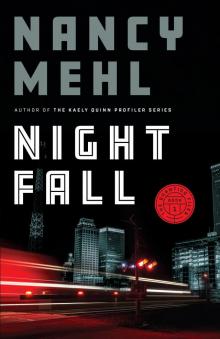 Night Fall
Night Fall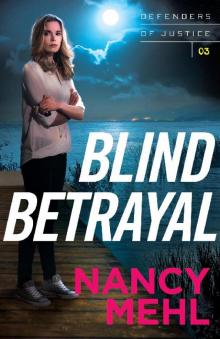 Blind Betrayal
Blind Betrayal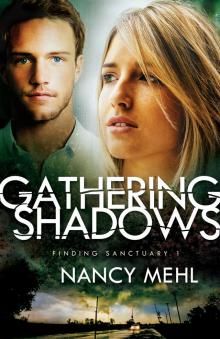 Gathering Shadows
Gathering Shadows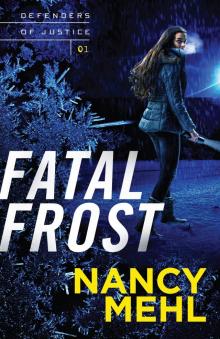 Fatal Frost
Fatal Frost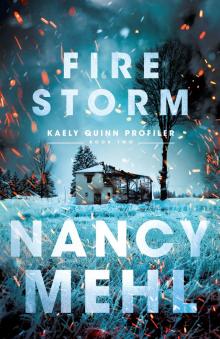 Fire Storm
Fire Storm Dead End
Dead End Unforeseeable
Unforeseeable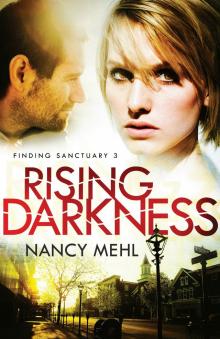 Rising Darkness
Rising Darkness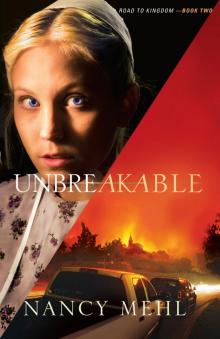 Unbreakable
Unbreakable Simple Secrets (The Harmony Series 1)
Simple Secrets (The Harmony Series 1)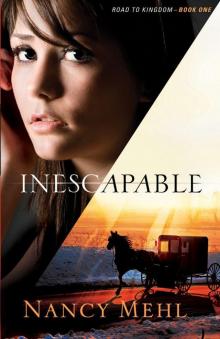 Inescapable
Inescapable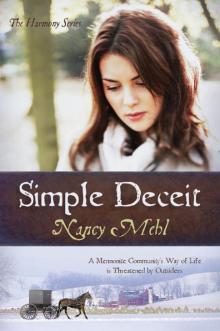 Simple Deceit (The Harmony Series 2)
Simple Deceit (The Harmony Series 2)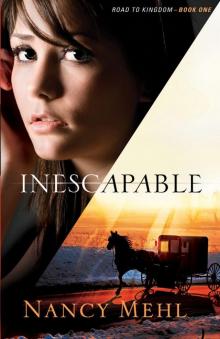 Inescapable (Road to Kingdom Book #1)
Inescapable (Road to Kingdom Book #1)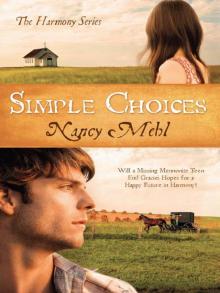 Simple Choices
Simple Choices